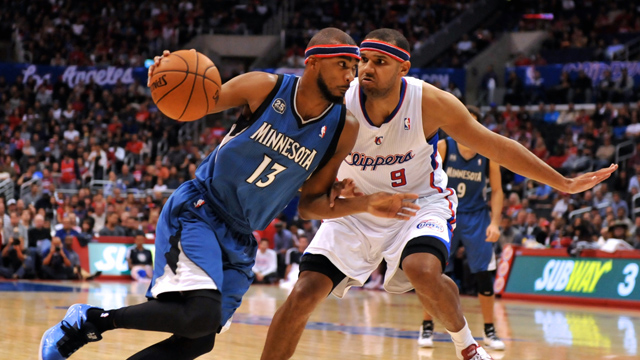By John Wilmes
The roads into the NBA make for scenery, goals and lifestyles that are not always what people expect.
The favored biography of a pro basketball star is one of extreme ascendance: a young, disadvantaged man walks a fine line between trouble and discipline, denying any number of demons, trumping any array of doubters on his way. He is poor and his world is broken, but there is hope in the game of basketball, there is possibility in passion for this game.
But a recent New York Times study by Seth Stephens-Davidowitz puts a lens to the matriculation of the NBA’s bevy of talent, and its results conclude that the gusto of these tales is most definitely the stuff of outliers. The real roads to the NBA are largely as traditional, rote and predictable as those into any other profession.
Stephens-Davidowitz’s research suggests that “black N.B.A. players are about 30 percent less likely than the average black male to be born to an unmarried mother and a teenage mother.” This is but one measure he uses to convincingly demonstrate his thesis, which lies in his title: “In the NBA, Zip Code Matters.”
Prominence in professional basketball is largely as traceable along socio-economic lines as it is in most other jobs. Glory in this league is not necessarily the result of passion and fortitude so much as it is a collection of market forces.
This is not to say that the leap from dreaming of the NBA to actually making it (and the task of staying there) does not make for a rich, complex economy. Alterations in the league’s demographic trends over time tell us that there is a market of intellectual know-how on the ramp into the league, and that it’s subject to redistribution.
survey of who makes it into the NBA can be broken into three extreme “types,” with plenty of grey area between them.
There’s the shooting stars like Rose and James, the increasingly present international players (Stephens-Davidowitz says that European population in the NBA has gone from 2% to over 20% since 1980), and then there’s the most common members of the league.
The Born-and-Bred Basketball Men
The majority of the NBA is made up of American players with strong family, cultural and educational structures. Their lives are built for professional athletic success. These are men who’ve scarcely ever had a hard time coming by the nutrients, training and developmental resources that are essential for most to develop into a pro.
Another way of saying this is that the more it’s examined and scrutinized, the professional structure of the NBA reveals itself to be more and more like that of my job and yours. Upbringing and networking are essential—as is learning from the elders of your vocation.
Currently, there are 21 NBA players whose fathers also played in the league, a figure that makes up nearly six percent of who’s on teams. This is no coincidence, as getting close to someone with professional experience is an important bridge into a career for many.
Minnesota Timberwolves forward Corey Brewer stresses the importance of finding an NBA veteran from which to learn the professional language of the league.
He names Greg Buckner, a former journeyman who averaged 5.0 points per game for as many teams over ten NBA seasons as someone who showed him the ropes to the profession. “He’s from Hopskinville, Kentucky,” Brewer tells me. “Not too far where I’m from, maybe 40 minutes. A guy like that, he’s not a big name guy, but he stayed on the roster, did the right things, and he helped me with to do the right things.”
Buckner now works as a player development coach with the Houston Rockets.
Brewer has no rose-colored glasses for what he does, talking of his role at his job with the bluntness of an economist sizing up a mom-and-pop operation. “I’m not as talented as some other guys, but I work my butt off,” he says. “Some guys are so talented they just have to work a little bit. Guys like me, we’re not the most talented, but we play hard every night and we do the right things.”
Brewer may not have been born into an NBA trajectory the way some of his peers did—in fact, he grew up in a trailer park in Portland, Tennessee—but his is a tale of a critical mass of hard work and hard networking paying off over time.
After working with Buckner and becoming a high school stud, Brewer was recruited to the University of Florida, where he won two national titles with future NBA All-Stars Joakim Noah and Al Horford. As someone who started from a place of poverty but found his way to the league not on sheer overwhelming talent but through a collection of intense work, strong decisions and fateful connections, Brewer stands as something of a hybrid of our two domestic types.
But just what are these right things that Brewer mentions more than once?
To continue reading the article visit Bleacher Report
